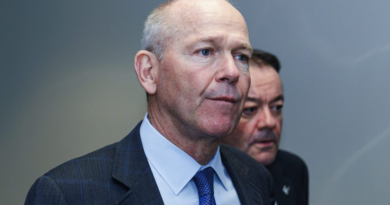Shark Tank’s Kevin O’Leary says people are ‘idiots’ for spending money on coffee every day
Your store-bought turkey and cheese sandwich washed down with a Starbucks latte will only taste like regret, according to Shark Tank star Kevin O’Leary.
People are burning holes in their pockets buying sandwiches and coffee en route to the office, the venture capitalist said in an Instagram video last week. Instead, those precious dollars could be placed in savings or investments.
“A coffee for five dollars and fifty cents. You go to work, you spend fifteen bucks on a sandwich,” O’Leary said in the clip. “What are you, an idiot?”
O’Leary argued those $20-a-day purchases could add up for those just becoming financially stable.
“Most people, particularly working in metropolitan cities, are just starting out their jobs, making the first $60,000, piss away about $15,000 a year on stupid stuff,” he added.
O’Leary’s argument harkens back to that of luxury property developer Tim Gurner, who argued in 2017 that young people are unable to afford to purchase homes because they’re wasting money on avocado toast and expensive drinks, spurring a long-standing meme about the generation’s affinity for the breakfast food.
“When I was trying to buy my first home, I wasn’t buying smashed avocado for $19 and four coffees at $4 each,” Gurner said. “We’re at a point now where the expectations of younger people are very, very high.”
Avocado toast economics, debunked
For all O’Leary’s conviction about the dangers of a mid-afternoon latte fix, there’s plenty of evidence to suggest consumers can have their coffee cake and eat it, too. The avocado toast generation of millennials and their cold brew-slurping Gen Z counterparts have been big winners in the post-pandemic economic recovery. Their wealth increased 40% from 2019 to 2023, according to Center for American Progress, a left-leaning think tank. Young people are also getting better deals on mortgages than older generations, with mortgage rates averaging 4% for Gen Z and millennials compared to 4.1% for Boomers, per Freddie Mac.
The spending habits of these younger generations have demonstrated that financial security and splurging on snacks aren’t mutually exclusive. Young people are keenly aware of financial pressure, a July 2024 Bank of America report indicated. Among over 1,000 Gen Z adults surveyed, over 50% believed the high cost of living was their biggest financial hurdle preventing them from being successful. The generation has turned to budgeting to save cash.
“They’re feeling the high cost of living,” Holly O’Neill, president of retail banking at Bank of America, told Fortune in July. “They know they need to set a budget, and they know they need to find ways to cut back, and they look at those budgets…in order to meet those priorities.”
Cutting back hasn’t come at the expense of wining and dining, however. While young people have braced themselves for financial pressure, they’ve also begun to feel more optimistic about the economy, according to a May 2024 report from McKinsey & Company using a survey of over 4,000 respondents. Younger generations are more likely to selectively splurge on nonessentials, particularly going out to eat, with 38% of Gen Z and 41% of millennials intending to splurge on restaurants, dining out, and bars.
But financial health aside, an extra coffee or quick lunch out isn’t going to break the bank for young people, NerdWallet senior economist Elizabeth Renter, told Marketplace. She calculated that in a world where avocado toast costs $14, and lattes cost $4, if someone wanted to make a 20% downpayment on a $313,200 home, they would have to give up 5,220 avocado toasts and 15,600 lattes.
“So the whole idea that you could just cut out your avocado toast and all of a sudden you’re gonna have enough money to purchase a house is very oversimplified,” Renter said. “If your weekly lattes make you happy and you’re not in dire financial straits, then drink them.”
Term Sheet: Industry-leading news and analysis on private equity, venture capital, and deal-making.
Sign up here.



